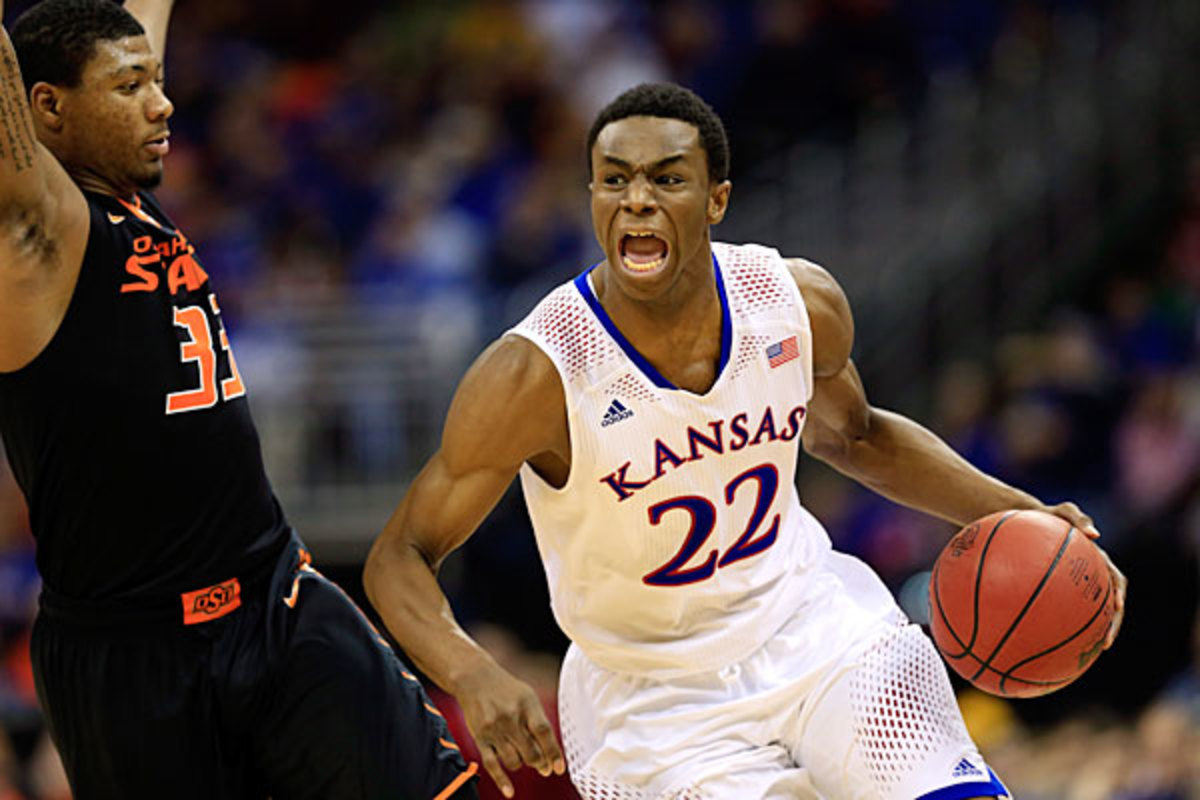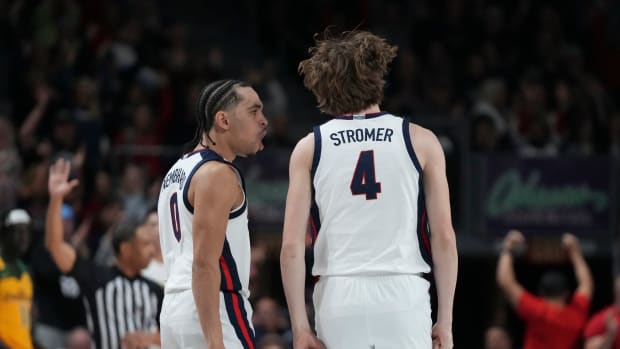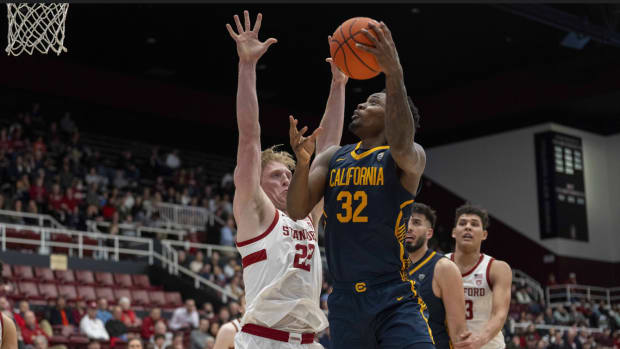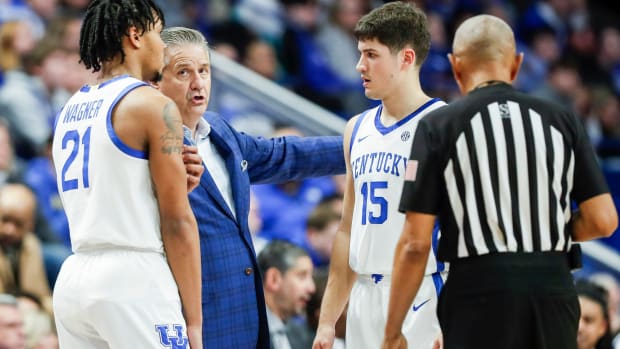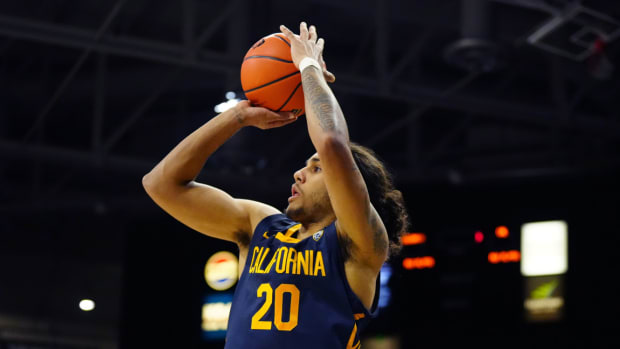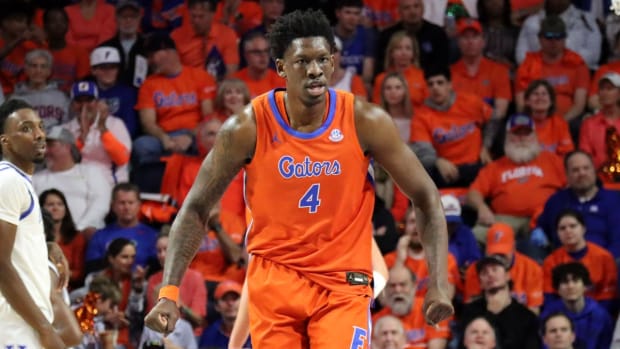Kansas' Wiggins, Duke's Parker among top underclassmen in NCAA tournament
Big 12 rivals Marcus Smart (left) and Andrew Wiggins are both capable of leading their teams on deep tournament runs. (Jamie Squire/Getty Images)
On Monday, Kansas coach Bill Self was asked if Andrew Wiggins felt compelled to take over for the Jayhawks right now, to seize the reins and the moment in March with fellow freshman Joel Embiid sidelined due to a back injury.
As if mentally thumbing through box scores that revealed Wiggins has averaged 31 points per game in the Jayhawks' previous three outings without Embiid, Self noted that his prized freshman forward probably felt that need a week or two ago.
“It's the same thing we've been talking to him about for the vast majority of year,” Self said. “Try to impact more possessions and be more aggressive and that kind of stuff. He's young. He should be a high school senior. On a brighter stage, to see how he reacts will be interesting. But all evidence points to that he is poised and ready to be aggressive and play at a high level.”
Some teams in the field of 68 will be led by veteran cores, and many of those are among the favorites: Florida, Arizona, Michigan State. But given the inevitable one- or two-and-done culture of college basketball, plenty of others, like Kansas, Duke and Kentucky will be led by relative youth. So here's an alphabetical look at the best underclassmen (freshmen and sophomores) in the NCAA field:
Kyle Anderson, sophomore, UCLA
There might be no greater basketball freak in the tournament than the Bruins' 6-foot-9 floor general. Anderson averages 14.9 points on 48.8 percent shooting, but that's the relatively pedestrian part of it. He also averages 6.6 assists per game, sixth-best nationally, and 8.8 rebounds, with 250 of those coming off the defensive glass, the second-best figure in the country. Essentially, Anderson is a one-man fast break: He can jumpstart transition with the board, move it up the floor and find a teammate or finish himself.
Tyler Ennis, freshman, Syracuse
While the Orange dipped late by losing five of their last seven to fall to a No. 3 seed in the NCAA brackets after starting 25-0, it's important to recognize that Ennis, until the early part of February, was considered perhaps the most clutch player in the country. Who knows where Syracuse would be without him? Like VanVleet, Ennis is a facilitator on both offense and defense. He led the ACC in both assists per game (5.6) and steals per game (2.1), and his assist-to-turnover ratio of 3.2-to-1 ranked 20th in the country. The 6-2 Canadian's win shares total -- the amount of victories estimated to be a product of his performance -- of 5.1 underscored how he became, unexpectedly, one of the marquee names of a marquee freshman class.
Jabari Parker, freshman, Duke
Parker might be the only player in the nation whose season-long body of work could challenge Creighton's Doug McDermott in the Wooden Award conversation. Once he convinced himself – or was convinced by others – to ditch his face-up jumper game and attack the rim consistently, the 6-8, 235-pound Parker became almost unstoppable. He's averaged 19.3 points and 8.8 rebounds for the year but had six straight double-doubles at one point from mid-February to mid-March. And everything runs through him: His possession percentage (31.2) and shot percentage (32.3) both ranked second in the ACC.
Julius Randle, freshman, Kentucky
While the Wildcats have not ascended to the heights most expected, the 6-9 Randle has been mostly as anticipated: He is a double-double machine, because that is exactly what he averages every night on the court. Randle averages 15 points and 10.5 rebounds, the latter number ranking eighth in the nation. There are few better glass cleaners, especially given how deft Randle is at creating opportunities for himself. His 118 total offensive rebounds rank second in the country and his average of 3.5 per game ranks 22nd. He's doing what he can to help Kentucky meet its goals: His win shares total of 5.0 is even better than Wiggins' (4.8).
Marcus Smart, sophomore, Oklahoma State
Smart contributed to the midseason death spiral that nearly blew up the Cowboys' entire season, and then watched during a three-game suspension for shoving a fan as it continued, eventually becoming a seven-game losing streak. But he had to save his team when he returned, and he did exactly that. Smart averaged 17.8 points, 5.7 rebounds and 4.7 assists for Oklahoma State overall, and his win shares total (5.4) effectively matched his total from his stellar freshman season (5.5). But during the last five regular season games, after his return to the lineup, Smart averaged 19.8 points, 6.4 assists, 5.2 rebounds and 4.5 steals per contest. If there's a reason No. 1 seed Arizona loses in the round of 32, it could be Smart.
Fred VanVleet, sophomore, Wichita State
There are underclassmen with gaudier numbers, but it's willful ignorance to dispute VanVleet's place among them. He is the engine for the Shockers' 34-0 run to a No. 1 seed and top 10 ratings in both adjusted offensive and defensive efficiency. His raw numbers are merely solid – 12.1 points, 5.3 assists per game, 49.6 percent shooting. But the raw numbers aren't enough to explain his impact. VanVleet's offensive rating of 132.4 is 12th-best in the country and his win shares total is 6.9, fifth in the nation. He is the only player in the top 20 nationally for both offensive win shares (4.3) and defensive win shares (2.6).
Andrew Wiggins, freshman Kansas
Lawrence
